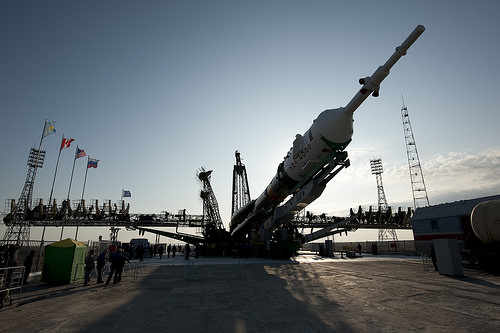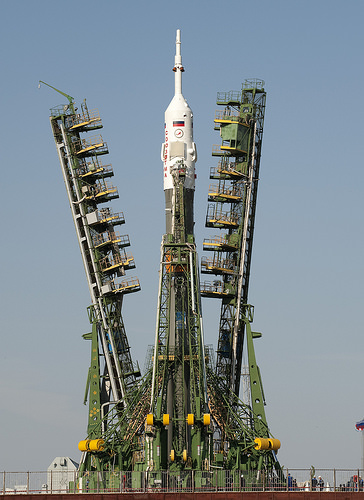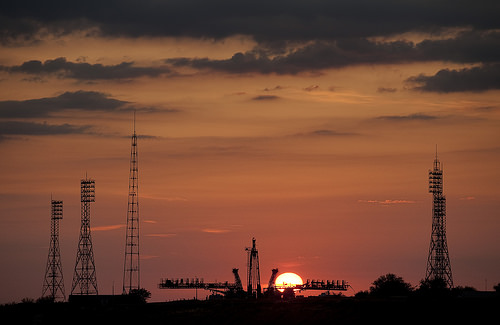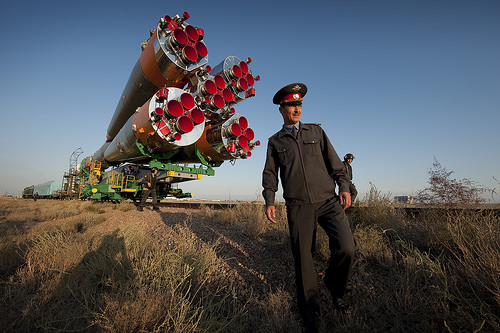[/caption]
NASA photographer Bill Ingalls is in Russia at the Baikonur Cosmodrome in Kazakhstan, capturing the rollout of the Soyuz TMA-16 rocket today, scheduled to launch on Sept. 30 to the International Space Station. Of course the Soyuz rollout and launch is a whole different experience from the shuttle rollout, and these pictures tell the story. Additionally, this launch has a bit more “festive” feel to it: spaceflight participant Guy Laliberte, founder of Cirque du Soleil, is part of the crew. Also on board, Soyuz Commander Max Suraev, and NASA Flight Engineer Jeff Williams are scheduled to launch at 2:14 a.m. CDT on Wednesday, Sept. 30.
Above, a Russian security officers walk along the railroad tracks as the Soyuz rocket is rolled out to the launch pad.

The Soyuz rocket being hoisted to its launch position shortly after arrival to the launch pad Monday.
Laliberte is paying some $35 million for a seat on the Soyuz and 12 days aboard the ISS. He’s likely to be the last paying private citizen to the station for the next few years. Because of the retirement of the space shuttle, the Soyuz will be the only way to get astronauts and cosmonauts to and from the ISS.


Padalka, Barratt and Laliberte will return to Earth on Saturday, Oct. 10, in the Soyuz TMA-14 spacecraft currently docked to the station. Padalka and Barratt have been on the ISS since March 2009.
To see more images from the Soyuz rollout, check out NASA’s Flickr page.


Such a pity that Russia has to make do on a shoestring budget. The Soyuz is so pretty. I wish there’d been a chance to continue development.
3rd image down – goodness that looks impressive
It’s amazing that this rocket was developed over 40 years ago and is still flying with (almost) no flaws. What was flying in the US 40 years ago?
Sili, apropos continuing development:
“Soyuz-TMA (2003–…. )
Main article: Soyuz-TMA
Soyuz TMA (A: ??????????????????, Antropometricheskii meaning anthropometric) features several changes to accommodate requirements requested by NASA in order to service the International Space Station, including more latitude in the height and weight of the crew and improved parachute systems. It is also the first expendable vehicle to feature “glass cockpit” technology. Soyuz-TMA looks identical to a Soyuz-TM spacecraft on the outside, but interior differences allow it to accommodate taller occupants with new adjustable crew couches.
[…]
The unmanned Progress spacecraft were derived from Soyuz and are used for servicing space stations.
While not being the direct derivatives of the Soyuz, the Chinese Shenzhou spacecraft and the Indian Orbital Vehicle follow the general template as pioneered by the Soyuz.” [Wikipedia]
In fact, the Shenzhou looks like a rather good evolution of the basic design.
As from 2010 a yet again upgraded Soyuz will start commercial flights from EU’s arianespace center in french guiana. I guess this will keep them running for quite a number of years to come.
See: http://www.arianespace.com/spaceport-soyuz/entry.asp